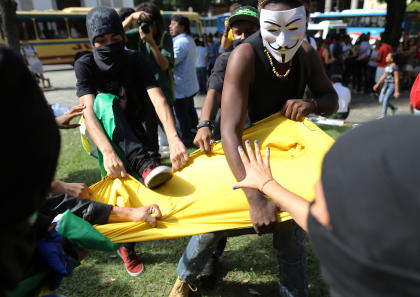Fear, fun coincide in Rio on opening day of World Cup

For complete World Cup 2014 coverage visit Yahoo Sports and follow @YahooSoccer
RIO DE JANIERO – Suddenly, everyone was running.
It was not clear at first what people were running from. But the fear was etched into every face – eyes wide, heads on a swivel. The food stands on the seaside street cleared out as if a storm had suddenly dropped buckets of rain. Hundreds of soccer fans, most of whom couldn't get into the packed fan fest on Copacabana beach to watch Brazil's opening World Cup game, were darting through one of the most famous escapes in the world, trying themselves to escape.
"Everybody starts running, and then you start running," said Roman Blecic, one of a few Croatian fans in an ocean of green and yellow. He and his wife, Luciana, who is from Brazil, had come to the beach as a household divided. The two met on a cruise ship, years ago, and here they were in soccer heaven. They gave their kids Neymar jerseys and painted their faces checkered red and white – to be fair. It was a great time.
Then they were carrying their kids to safety.
"Right away, you run," Luciana said. "You don't wait to know."

After a moment, the reason for the fear was clear: protesters were storming down the street toward the fan fest. They were surrounded by police in full battalion gear, with helmets and leg pads and bulletproof vests and their blood types written on their nametags. The protesters were unarmed and chanting; the police were ready for a riot. And the fans were scared of whatever might happen next.
Tensions have been building here for weeks. A lot of people in this city and elsewhere in Brazil don't understand why there was a rush to pour resources into a soccer event and no apparent hurry to provide resources to the poor and infirm.
"What mobilized people is to see what great effort was made for the stadiums," said Flavio Pastos, 33. "And we see no effort to resolve other needs of the people."
That inconsistency led to emotions ranging from vexed to irate. Soccer fans like Pastos want to see Brazil win, but they worry that a triumphant end would justify the wrong means. It's as if a World Cup victory is a win for both the right and wrong people. A man dressed as Batman carried a sign saying, "It doesn't make sense to be the soccer country if there's no health and education."
Yet thousands of people don't flock to the beach to cheer for health and education. In fact, the schools and businesses shut down for the first day.
"What I'm afraid of is I'd like Brazil to win but I'm afraid we'd forget," Pastos said after the initial panic had given way to a tense quiet. "Oh, Brazil is the country for soccer and the best. But it's not the best place for our people to live in."
Pastos isn't some anarchist dropout, either. He works for the government.
The entire day here was a study in these mixed emotions. It began with joy: thousands lining up on the seaside to gather, cheer, dance, and celebrate their national team. Music played, horns blasted, untold camera photos were taken.
At just after 3, though, protesters gathered by the nearest subway station. A police officer who was standing outside the entrance, appearing bored, smiling at passing girls, hurried into action when a group carrying signs emerged. He and his fellow policemen lined up, single-file, and began to walk through the marching group. A woman named Camila blocked their way.
It was a jarring moment: a 31-year-old woman in jeans and Dolce and Gabbana sunglasses stood facing a phalanx of policemen. She stared them down for minutes and it was unclear what would come of this. She wasn't going to instigate, but the police weren't going to attack an unarmed woman who was saying nothing.
Eventually, the police stepped away, and other protesters rushed to Camila to embrace her and thank her for her bravery. It was a small victory.
"I am here," Camila said, "to fight for another society."

That society, however, wasn't going to be won on this Thursday. The police simply lined up elsewhere. And when the protesters moved toward the party to the fan fest on the beach, the police followed. There was no violence to match the unrest in San Paolo – other than a protester in a jester hat taking a couple of swings as he danced away from the cops – but the afternoon was a tinderbox of both festival and fright. One protester wore a Brazil jersey labeled "Favela Kombat."
"This is not against the World Cup," said a man named Ricardo. "It's for rights. With that police, we will not have rights."
Only a few minutes after all the commotion subsided, the policemen and the protesters were mostly standing still, watching soccer. It was as if the two sides agreed to take a break to see the game. When Brazil scored to tie it up at 1 after Croatia took an early lead, the entire street felt like Carnivàle. Flags waved, people hugged, women posed for selfies and giggled.
[Photos: World Cup Day 1 in images]
Then it was back to the standoff, with the cops watching and the protesters chanting.
There were no more street-clearing rushes after that. Things settled down. It's funny how winning soothes. But the coming weeks will bring more of the same: more celebration, more conflict.
This is a nation of great pride and great problems. Both will last.
